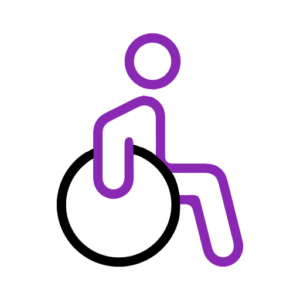
A disability can be defined briefly as a condition of the body or mind that impacts the person when doing certain activities and interacting with the world around them.

Autism Spectrum Disorder (ASD) is a complex neurodevelopmental condition characterized by challenges in social communication, repetitive behaviors, and often restricted interests, presenting across a wide spectrum of severity and individual differences.
ADHD (Attention-Deficit/Hyperactivity Disorder) is a neurodevelopmental condition characterized by difficulties in sustaining attention, hyperactivity, and impulsivity, impacting focus and self-control.
Communication disorders encompass a range of conditions hindering effective speech, language, writing, reading, or non-verbal communication, impacting an individual's ability to convey or understand information. These disorders can include speech sound disorders, language disorders, stuttering, voice disorders, and more.
Specific learning disorders are neurodevelopmental conditions causing difficulties in acquiring, processing, or demonstrating skills in specific academic areas (e.g., reading, writing, mathematics) despite normal intelligence and educational opportunities, as seen in conditions like dyslexia, dyscalculia, and dysgraphia.
Motor disorders encompass conditions affecting movement control and coordination, such as developmental coordination disorder (DCD) or conditions like cerebral palsy, impacting muscle tone, posture, and physical abilities due to neurological issues or brain abnormalities.


Our registered dietitians provide personalized nutrition counseling to help you achieve your health goals. We focus on creating sustainable lifestyle changes, not quick fixes.
Damage to the brain caused by external factors (like trauma, stroke, or infection) after birth, resulting in cognitive, physical, emotional, or behavioral impairments.
Surgical removal or loss of a limb (arm, leg, hand, or foot) due to injury, disease, or medical necessity, impacting physical abilities and often requiring assistive devices.
Conditions affecting the nervous system, encompassing a wide range of disorders such as epilepsy, multiple sclerosis, or Parkinson's disease, leading to various cognitive, motor, or sensory impairments.
Types of paralysis resulting from spinal cord injuries or neurological conditions. Paraplegia affects the lower half of the body, quadriplegia affects all four limbs, and hemiplegia impacts one side of the body.
Visual impairments refer to conditions causing partial or complete loss of vision, while hearing impairments refer to partial or complete loss of hearing, both impacting sensory perception and communication abilities.